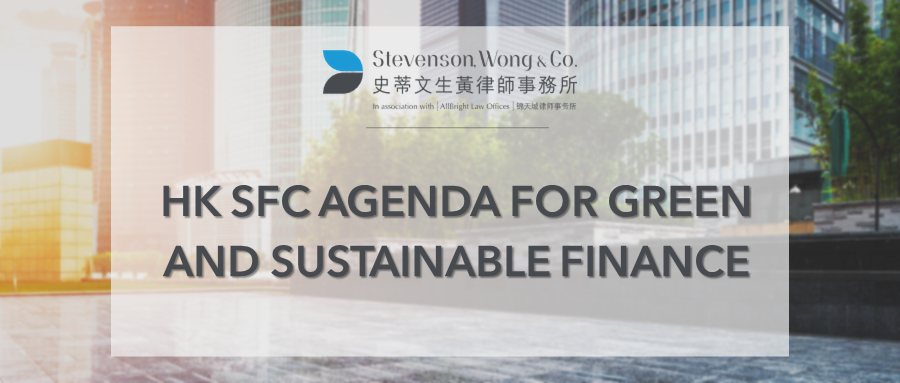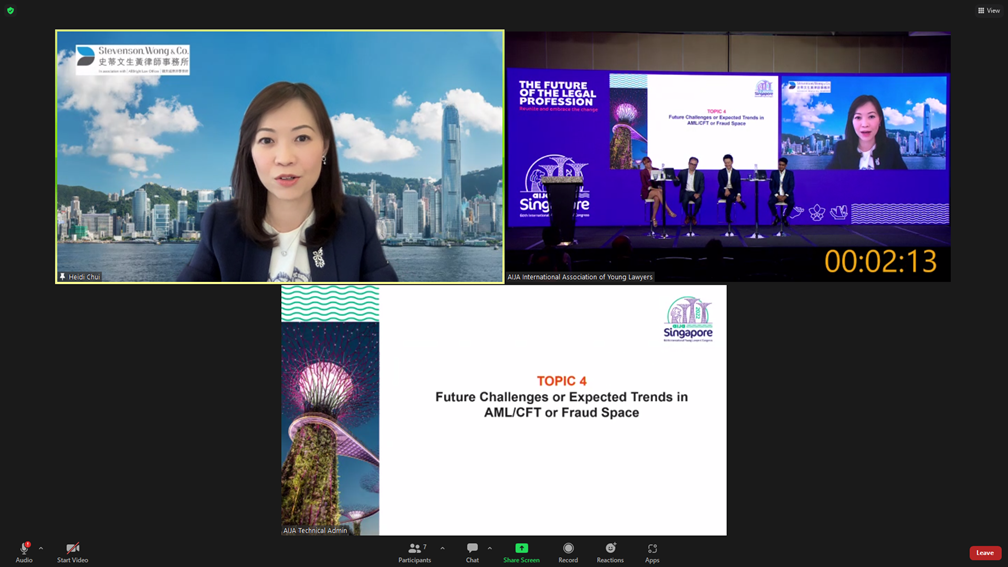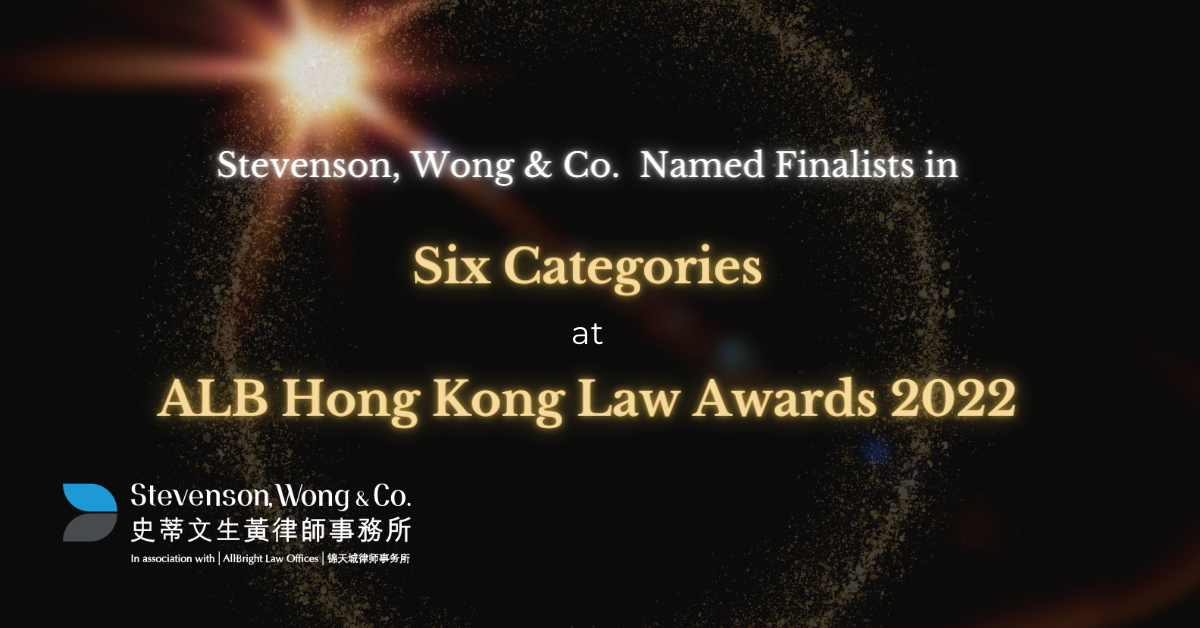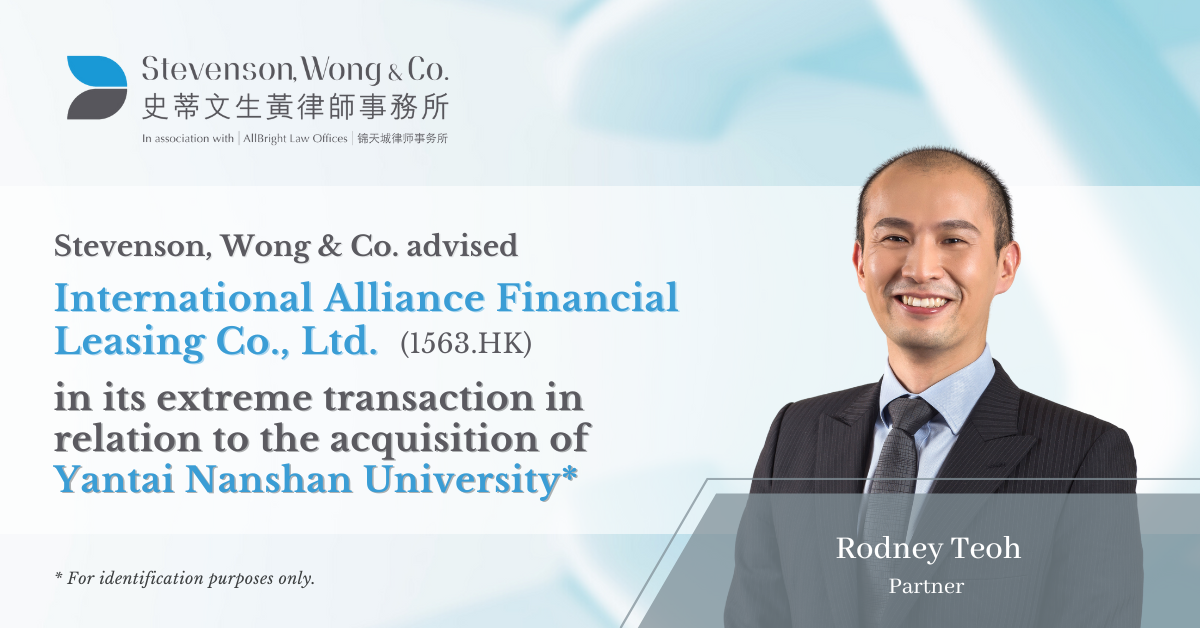Background
On 2 August 2022, The Securities and Futures Commission (the “SFC”) published an Agenda for Green and Sustainable Finance (the “Agenda”) outlining its further steps to support Hong Kong’s role as a regional green finance centre. The SFC will continue supporting the development of green and sustainable finance in Hong Kong and the transition to a greener economy through enhancing the quality of information available, increasing transparency and building trust for investors. The three main areas of focus are:
(1) Enhancing corporate disclosures;
(2) Monitoring the implementation of and enhancing existing measures relating to environmental, social and governance (ESG) funds and expectations for fund managers; and
(3) Identifying an appropriate regulatory framework for any proposed carbon markets.

Corporate disclosures
In relation to disclosures, the SFC is strongly aligned with the approach adopted by the International Organization of Securities Commissions (“IOSCO”) and acknowledges how the International Sustainability Standards Board (“ISSB”) could set out a path, with its proposed climate standard, which is built on the Task Force on Climate-related Financial Disclosures (“TCFD”) framework, forming a comprehensive global baseline for climate-related disclosures. The SFC shall continue to support the work of the new ISSB and sustainability disclosures more generally, including:
- Continuing to work with The Stock Exchange of Hong Kong Limited (“SEHK”) on a proportionate approach to corporate disclosure requirements that are aligned with global baseline standards.
- Working with other Cross-Agency Steering Group (“CASG”) members to consider how the requirements in the new ISSB climate standard Exposure Drafts could be adopted as part of Hong Kong’s domestic reporting framework.
- Engaging with the China Securities Regulatory Commission (“CSRC”) on the use of the ISSB climate standard to enhance cross-border consistency.
- Continuing to participate in the work of IOSCO on corporate sustainability disclosures.
In particular, a SFC-SEHK joint working group will continue to examine the readiness of listed companies to report under the proposed ISSB climate standard and the challenges faced by them, and to consider a framework aligned with the ISSB climate standard for Hong Kong. Other longer-term considerations include the digitalisation of climate reporting information, capacity building needs, and the development of an assurance framework in Hong Kong.
Internationally, the SFC will continue to participate in IOSCO’s work on reviewing the ISSB Exposure Drafts and considering assurance issues, as well as monitoring the work being done by the Network of Central Banks and Supervisors for Greening the Financial System (NGFS) Workstream on bridging the data gaps.
Monitoring the implementation of and enhancing existing measures
Asset management
The SFC has implemented measures to require fund managers to take climate-related risks into consideration in their investment and risk management processes as well as to make appropriate disclosures to meet investors’ demand for climate risk information and to combat greenwashing. Going forward, the SFC will continue to monitor the implementation of the measures and seek to enhance regulatory supervision in order to align with international regulatory development trends, including (i) continuing to consider the issues concerning the data underpinning asset manager disclosures, and (ii) maintaining regular dialogues with the industry to monitor the progress of licensed fund managers’ incorporation of new climate-related risks conduct and disclosure requirements, and provide the necessary clarification and guidance to the fund managers.
ESG funds
The SFC will continue to monitor ESG funds’ compliance with the requirements set out in its June 2021 circular. It will also continue its engagement with stakeholders, including hosting industry workshops to provide guidance, as well as working with the Investor and Financial Education Council (“IFEC”) to enhance investors’ awareness of ESG funds.
Taxonomy
One of the CASG’s action points is to aim for the adoption of the Common Ground Taxonomy (“CGT”) in Hong Kong. As a member of both the International Platform on Sustainable Finance (“IPSF”) and its Working Group on Taxonomies, the SFC will continue to monitor developments in this area, with a view to considering how the adoption of the CGT could complement the SFC’s existing regulatory and supervisory measures.
Education and training
Effective investor protection must include measures to educate investors. The SFC will continue to work with the IFEC to support investor education in this field, through regular updates via online and social media platforms, publicity campaigns, press events, public talks and stakeholder collaborations. The SFC will also continue to support the CASG’s efforts in relation to the GSF Centre and to contribute to IOSCO’s capacity building work, both through the IOSCO’s Sustainable Finance Task Force (“STF”) workstream on promoting good practices and the IOSCO Asia-Pacific Regional Committee (APRC).
Technology and innovation
The SFC will continue to work with other CASG members and stakeholders to facilitate the development of technologies to support green and sustainable finance initiatives locally, regionally and internationally. In particular, there is a plan to create a free and publicly accessible greenhouse gas (GHG) emissions estimation tool, with clearly-disclosed methodologies, that companies can use as an alternative source of information.
Regulatory framework for carbon markets
Hong Kong has a strategic role in adding value to carbon market development. There are two key types of carbon markets – voluntary carbon markets (“VCM”) and compliance markets or emissions trading schemes (“ETS”). At present, ETS only cover a small part (around 16%) of total global emissions. For corporates that do not fall under ETS, VCM may enable them to neutralise their emissions as they work on emissions reduction, and help channel capital to underlying projects to generate carbon credits. The SFC will focus on identifying the appropriate regulatory framework for the proposed business models. In addition, the SFC will continue to participate in the IOSCO STF’s carbon market workstream, with a view to supporting international developments in the transition to a greener global economy and considering the relevance of such developments to Hong Kong.

Analysis and takeaways
Jurisdictions worldwide have sought to respond to the urgent need to address the impact of climate change. Environmental issues have become a key focus for governments in different countries and it is recognised that private sector investment is vital to help fund the move towards a greener global economy. The SFC has been at the forefront of efforts to develop an effective regulatory framework for green finance in Hong Kong. The Agenda aims to enhance the quality of information available, increase transparency and build trust for investors, thereby supporting investment flows into sustainable projects that will drive forward net zero targets.
Please contact our Partner Mr. Rodney Teoh and Associate Ms. Angela Lau for any enquiries or further information.
This news update is for information purposes only. Its content does not constitute legal advice and should not be treated as such. Stevenson, Wong & Co. will not be liable to you in respect of any special, indirect or consequential loss or damage arising from or in connection with any decision made, action or inaction taken in reliance on the information set out herein.










